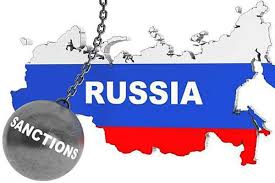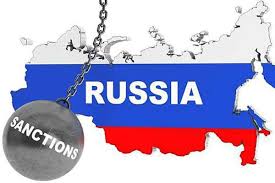
It is unlikely that any major harm for American investors could be caused by any Russian response to fresh sanction from the U.S. and therefore, such response is being merely seen as a symbolic gesture, says one political analyst.
After the U.S. House of Representatives voted overwhelmingly in favor of imposing new sanctions, Moscow stepped up its war of words against Washington on Wednesday. The country should consider a "painful" response for the U.S., a prominent member of the upper house of Russia's parliament said.
"Judging by the unanimous vote in the U.S. House of Representatives on the sanctions package against Russia, Iran and North Korea, there will be no breakthrough (in U.S. and Russia relations) … In fact, further degradation of bilateral cooperation is becoming inevitable," Konstantin Kosachyov, chairman of the Russian Foreign Relations Committee and member of the ruling United Russia party, said on his Facebook page on Wednesday.
for Russia’s alleged role in the destabilization of eastern Ukraine and to further punish the country for its annexation of Crimea in 2014, the planned sanctions on Russia were initiated. New restrictions on oil and gas projects are proposed in the bill, which passed by 419 votes to three.
Russia would be prepared to retaliate in the event of any hostile moves towards Moscow, and that it had repeatedly warned Washington that it was growing tired of showing restraint, the Interfax news agency reported Russia's Foreign Minister Sergei Ryabkov as saying on Wednesday.
Saying that the vote had taken the relationship into uncharted waters, Ryabkov argued the proposed sanctions would leave no room for ties between the two countries to improve in the near future.
If the drafted bill is signed by President Donald Trump, future cooperation between Moscow and Washington in fighting terrorism would be complicated, prominent Russian Senator, Franz Klintsevich told the RIA news agency.
Most likely a "more symbolic than substantive" response would be prompted by the U.S. legislation codifying and modestly expanding sanctions on Moscow, analysts at Eurasia Group predicted.
"Russia is not likely to take new action against U.S. investors in the country – though there's a low but worrisome chance that (President Vladimir) Putin will feel compelled to target at least one large U.S. corporate as a show of strength," Eurasia Group analysts said in a research note Tuesday.
Amid speculation President Trump could attempt to veto it, the White House said in a statement that it would review the bill. Before it can be signed by the president, the bill now needs to be passed through the Senate.
"While the president supports tough sanctions on North Korea, Iran and Russia, the White House is reviewing the House legislation and awaits a final legislative package for the president's desk," Sarah Sanders, White House spokeswoman, said on Tuesday.
Against both Russian companies and individuals, the U.S. already has an array of sanctions in place. The then-President Barrack Obama closed two Russian compounds and expelled 35 Russian diplomats in December, amid allegations of election hacking.
(Source:www.cnbc.com)
After the U.S. House of Representatives voted overwhelmingly in favor of imposing new sanctions, Moscow stepped up its war of words against Washington on Wednesday. The country should consider a "painful" response for the U.S., a prominent member of the upper house of Russia's parliament said.
"Judging by the unanimous vote in the U.S. House of Representatives on the sanctions package against Russia, Iran and North Korea, there will be no breakthrough (in U.S. and Russia relations) … In fact, further degradation of bilateral cooperation is becoming inevitable," Konstantin Kosachyov, chairman of the Russian Foreign Relations Committee and member of the ruling United Russia party, said on his Facebook page on Wednesday.
for Russia’s alleged role in the destabilization of eastern Ukraine and to further punish the country for its annexation of Crimea in 2014, the planned sanctions on Russia were initiated. New restrictions on oil and gas projects are proposed in the bill, which passed by 419 votes to three.
Russia would be prepared to retaliate in the event of any hostile moves towards Moscow, and that it had repeatedly warned Washington that it was growing tired of showing restraint, the Interfax news agency reported Russia's Foreign Minister Sergei Ryabkov as saying on Wednesday.
Saying that the vote had taken the relationship into uncharted waters, Ryabkov argued the proposed sanctions would leave no room for ties between the two countries to improve in the near future.
If the drafted bill is signed by President Donald Trump, future cooperation between Moscow and Washington in fighting terrorism would be complicated, prominent Russian Senator, Franz Klintsevich told the RIA news agency.
Most likely a "more symbolic than substantive" response would be prompted by the U.S. legislation codifying and modestly expanding sanctions on Moscow, analysts at Eurasia Group predicted.
"Russia is not likely to take new action against U.S. investors in the country – though there's a low but worrisome chance that (President Vladimir) Putin will feel compelled to target at least one large U.S. corporate as a show of strength," Eurasia Group analysts said in a research note Tuesday.
Amid speculation President Trump could attempt to veto it, the White House said in a statement that it would review the bill. Before it can be signed by the president, the bill now needs to be passed through the Senate.
"While the president supports tough sanctions on North Korea, Iran and Russia, the White House is reviewing the House legislation and awaits a final legislative package for the president's desk," Sarah Sanders, White House spokeswoman, said on Tuesday.
Against both Russian companies and individuals, the U.S. already has an array of sanctions in place. The then-President Barrack Obama closed two Russian compounds and expelled 35 Russian diplomats in December, amid allegations of election hacking.
(Source:www.cnbc.com)














